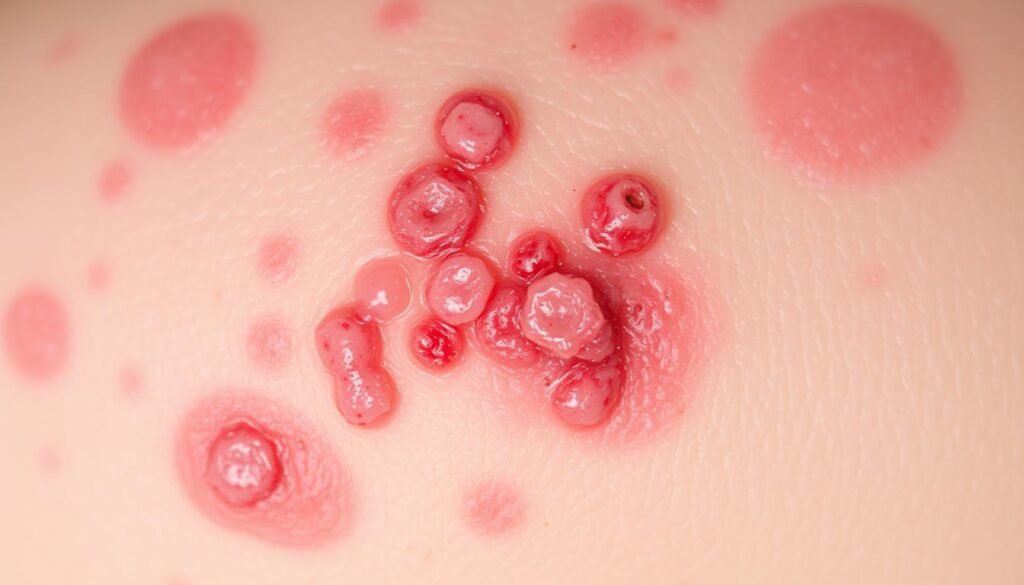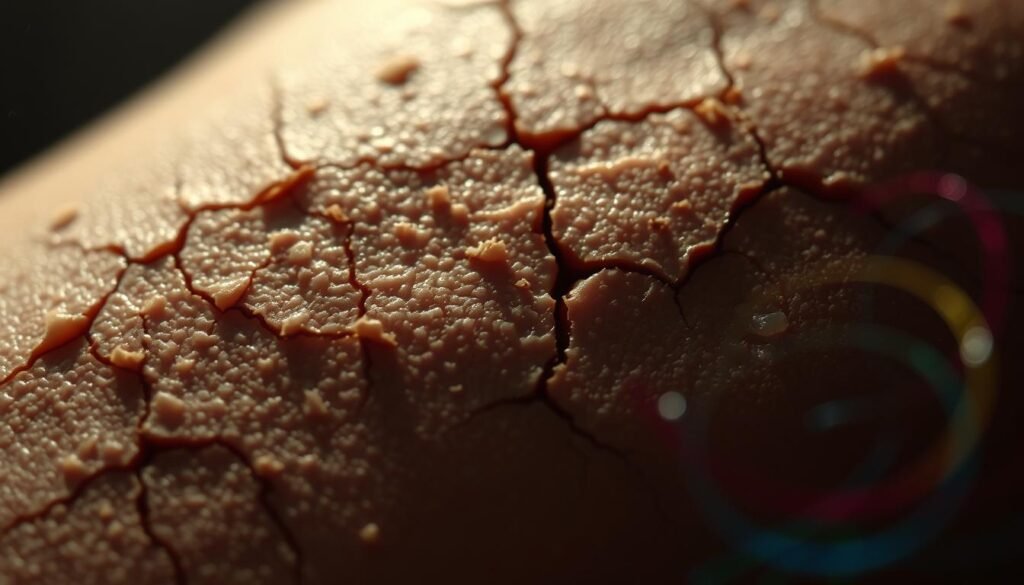Over 31 million Americans live with eczema. This condition goes way beyond just annoying skin irritation. Atopic dermatitis can cause lots of problems. These include skin infections, trouble sleeping, and big emotional effects. This skin problem can really mess with daily life and make people’s quality of life much worse. Studies show it’s also linked to more anxiety and depression.
To handle atopic dermatitis well, we need to get how complex it is. This understanding includes knowing how it affects both body and mind. Seeing the big picture helps realize how vital it is to treat not just the skin. But also the emotional issues people with this condition face.
Key Takeaways
- Over 31 million Americans suffer from some type of eczema, highlighting its prevalence.
- Atopic dermatitis can lead to serious skin infections, including Staph and herpes-related issues.
- Sleep disturbance affects many individuals with eczema, impacting their overall health.
- The emotional impact of eczema can increase the risk of depression and anxiety.
- Impaired quality of life is a significant concern for those with severe eczema.
- Management strategies must address both physical and mental health components of the condition.
- Understanding these complications is crucial for effective eczema treatment.
Understanding Atopic Dermatitis
Atopic dermatitis is a common skin inflammation problem. It affects both kids and adults. Surveys say about 20% of kids and 10% of adults in developed countries have it. This condition causes dry, itchy patches. It can lead to ongoing issues that affect daily life a lot.
The term atopic dermatitis definition covers several factors. These include genetics, environment, and how the body reacts, all affecting skin health. People with this condition are more likely to react to irritants. Things like allergens and stress can make symptoms worse.
Many people with atopic dermatitis might have staph bacteria on their skin. This can lead to infections that make the condition worse. Knowing how to manage these infections is key.
It’s vital to understand the social and emotional impacts of atopic dermatitis. It tends to start in childhood. Kids might struggle with self-esteem or being treated differently. Adults face these emotional challenges, too. It shows why treatment needs to care for both body and mind.
Learning how to handle complications and manage the condition is crucial. Things like skin care routines and knowing what triggers flare-ups help a lot. For more tips on dealing with atopic dermatitis, check out this resource.
Common Symptoms of Atopic Dermatitis
The symptoms of atopic dermatitis show up as different signs. It makes you itch a lot, which can start even without a visible rash. The skin may get dry and crack, especially on elbows, knees, and hands. Babies often have eczema rashes on their faces.
- Itchiness
- Dryness
- Cracking and crusting
- Scaliness and thickening of the skin
- Redness and discoloration
- Blistering and bleeding, especially because of scratching
Symptoms can get worse or better, changing from one person to another. Skin irritation can start at any age but usually begins in childhood. Those with worse symptoms might need special care. This can include using moisturizers or getting medical help. For more info on how to deal with this, check out this resource.
Even with treatment, atopic dermatitis can still be tough. It often comes with other health issues. This affects life’s quality.
Complications of Atopic Dermatitis
Atopic dermatitis isn’t just about skin symptoms. It deeply affects a person’s life. The skin’s protection can weaken, leading to serious related health issues. These include bacterial and viral infections. Staphylococcus aureus is a key player in skin infections for these patients. Also, the herpes simplex virus might lead to eczema herpeticum, a severe concern for those with the disease.
Asthma and allergic rhinitis commonly happen alongside atopic dermatitis. About 40% of people with this condition will have rhinitis. The risk of asthma is three times higher for them. Plus, many face a big risk of food allergies, with 30% possibly having food sensitivities.
The emotional and psychological sides are greatly affected too. Many deal with anxiety and depression. Stress can make symptoms come back or get worse, causing a tough cycle. It’s crucial to seek help from services like crisis support for managing these impacts along with the physical ones.
Following a strict skincare regime lowers the risk of these problems. Heart checks might be needed due to a possible link to cardiovascular issues. Understanding these complex issues helps improve life quality for those affected.
Skin Infections Related to Atopic Dermatitis
Skin infections are major problems for people with atopic dermatitis. These infections happen because the skin barrier doesn’t work well. Knowing about these risks early can help control them.
Eczema Herpeticum: A Serious Threat
Eczema herpeticum is a bad viral infection caused by the herpes simplex virus. It can cause painful blisters and might need hospital care if not treated. For those with atopic dermatitis, it adds more problems to their condition.
Getting antiviral treatment early is important. It can make eczema herpeticum less severe and shorter.
Bacterial Infections and Implications
People with atopic dermatitis often face bacterial infections. The most common bacteria is Staphylococcus aureus. It causes infections like abscesses and cellulitis when the skin barrier is damaged.
Almost 80% of people with eczema get a “staph” infection at some time. Doctors usually prescribe antibiotics. But it’s important to use them right to avoid bacteria becoming resistant.

Sleep Disturbances in Atopic Dermatitis Sufferers
Many people with atopic dermatitis, especially kids, have trouble sleeping. Research looking at 31 studies found they are more likely to have sleep problems. The itchiness linked to this condition significantly affects sleep quality. Patients often face interrupted sleep, trouble falling asleep, and waking up often. These issues can lead to problems thinking clearly and poor mental health.
The Impact of Itching on Sleep Quality
Itching severely lowers sleep quality for those with atopic dermatitis. Studies show about 80% of children and 33% to 87% of adults with this condition suffer from poor sleep. Nighttime scratching not only interrupts sleep but can also cause more stress and anxiety. This forms a vicious circle that makes it hard to manage sleep. The ties between low sleep quality and short sleep amounts are strong, showing how deeply these problems affect patients’ lives.
Strategies for Improving Sleep
There are proven ways to get better sleep. Some tips include:
- Keeping a regular sleep schedule that helps you wind down.
- Choosing soft, breathable sheets, like silk, to reduce discomfort.
- Doing calming activities, like reading or meditating, before bed.
- Looking into medical options, such as Dupixent (dupilumab), to lessen itching at night.
Using a broad approach to tackle the itch and sleep disturbances can make a big difference. This can lead to more peaceful nights and a better life. For more details on how atopic dermatitis affects sleep, check out this detailed study.
The Emotional Impact of Atopic Dermatitis
The emotional toll of atopic dermatitis goes beyond skin deep. It greatly affects mental health, causing more anxiety and depression. Over 30% of people with this condition also battle these mental health issues. This is much higher compared to the 7.6% in the broader populace.
Anxiety and Depression Correlation
Atopic dermatitis and mental health issues are deeply linked. The skin condition can lower self-esteem and life quality. Many teens with it feel bad about themselves and have mood changes. Dealing with these issues can make anxiety and depression worse. Help from National Eczema Association can really make a difference.
Social Stigma and Its Effects
Dealing with social stigma is hard for people with atopic dermatitis. Their visible symptoms can make them feel alone and worthless. This often leads them to avoid going out or seeing friends. Being worried about what others think can make their anxiety and depression even more intense. Creating a supportive community is key to overcoming these issues.

| Aspect | Impact on Mental Health |
|---|---|
| Emotional Distress | High levels of anxiety and depression reported |
| Self-esteem | Low self-esteem affecting social interactions |
| Social Withdrawal | Reduced participation in social activities |
| Quality of Life | Significantly diminished due to chronic symptoms |
| Support Systems | Importance of joining groups like Eczema Wise |
Impaired Quality of Life Due to Atopic Dermatitis
Atopic dermatitis majorly impacts people’s lives, making daily activities harder. The itching and discomfort from flare-ups limit routine tasks, causing frustration. Dealing with these symptoms takes a lot of time, from treating the skin to keeping it clean. This can mess with usual schedules and duties.
Challenges in Daily Activities
People with atopic dermatitis face many issues every day, leading to big disruptions. They deal with:
- Physical Limitations: Itchiness and pain hinder exercises and even basic chores.
- Time Consumption: Ongoing care routines take more time, impacting personal and job tasks.
- Social Interaction: Worry over how their skin looks and feels can make them avoid friends, causing loneliness.
- Poor Sleep Quality: Itching at night interrupts sleep, leaving them tired the next day.
Family and Relationship Strain
Atopic dermatitis also brings stress to families, putting strain on relationships. The emotional weight on caregivers can spark tension and misunderstandings. What’s involved:
- Caregiver Stress: Family members can get anxious and burned out from extra care duties.
- Financial Implications: Costs from handling atopic dermatitis can stress household budgets, influencing job choices and family health.
- Social Stigmas: Visible effects of the condition may cause social anxiety, hurting friendships and romantic relationships.
- Emotional Distress: Anxiety and depression from atopic dermatitis might create communication problems in families.
Improving lives impacted by atopic dermatitis requires good management strategies. Open talks in families and solid treatment plans can help. This support might lessen some difficulties faced.
Allergic Reactions and Atopic Dermatitis
People with atopic dermatitis often face allergic reactions that make their symptoms worse. It’s key to understand the role of food sensitivities in this condition. Foods like dairy, gluten, and nuts can trigger inflammation in those with eczema. Knowing potential allergens is crucial in treating this skin issue well.
Understanding Food Sensitivities
About 35% of kids with serious eczema might have food allergies. Noticing these sensitivities helps make diet plans that lessen symptoms and better skin health. Working with healthcare experts to identify and possibly cut out certain foods is essential.
Environmental Allergens and Their Role
Beyond food, things like dust mites, pollen, and pet dander can worsen eczema. These allergens are especially problematic for those with eczema from a young age. A strong link exists between these irritants and more severe eczema. Taking steps to avoid these allergens is important in managing eczema.
For extra help with the emotional and mental health challenges of living with eczema, check out resources here.